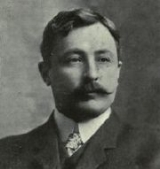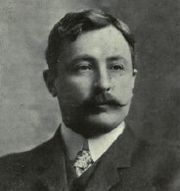
William Gibson Sloan
Encyclopedia

Plymouth Brethren
The Plymouth Brethren is a conservative, Evangelical Christian movement, whose history can be traced to Dublin, Ireland, in the late 1820s. Although the group is notable for not taking any official "church name" to itself, and not having an official clergy or liturgy, the title "The Brethren," is...
evangelist
Evangelism
Evangelism refers to the practice of relaying information about a particular set of beliefs to others who do not hold those beliefs. The term is often used in reference to Christianity....
to the Faroe Islands
Faroe Islands
The Faroe Islands are an island group situated between the Norwegian Sea and the North Atlantic Ocean, approximately halfway between Scotland and Iceland. The Faroe Islands are a self-governing territory within the Kingdom of Denmark, along with Denmark proper and Greenland...
and Shetland.
His parents were Nathanael and Elisabeth Sloane (Sloan) who lived in Bridgend, Dalry.
William became a missionary
Missionary
A missionary is a member of a religious group sent into an area to do evangelism or ministries of service, such as education, literacy, social justice, health care and economic development. The word "mission" originates from 1598 when the Jesuits sent members abroad, derived from the Latin...
, sent by the Tract Society of Scotland, to Shetland and Orkney. While in Shetland, Catholic
Roman Catholic Church
The Catholic Church, also known as the Roman Catholic Church, is the world's largest Christian church, with over a billion members. Led by the Pope, it defines its mission as spreading the gospel of Jesus Christ, administering the sacraments and exercising charity...
born Sloan came into contact with local Plymouth Brethren
Plymouth Brethren
The Plymouth Brethren is a conservative, Evangelical Christian movement, whose history can be traced to Dublin, Ireland, in the late 1820s. Although the group is notable for not taking any official "church name" to itself, and not having an official clergy or liturgy, the title "The Brethren," is...
and issues like "believers baptism" and the "breaking of bread" came up. Sloan converted and became "baptised by immersion into the water" and thence "broke bread" with the local Shetland Baptists, even though he never considered himself being a Baptist. He believed in the one Congregation of God.
It was in this belief that he, in 1865 decided to become an evangelist
Evangelism
Evangelism refers to the practice of relaying information about a particular set of beliefs to others who do not hold those beliefs. The term is often used in reference to Christianity....
to the Faroe Islands
Faroe Islands
The Faroe Islands are an island group situated between the Norwegian Sea and the North Atlantic Ocean, approximately halfway between Scotland and Iceland. The Faroe Islands are a self-governing territory within the Kingdom of Denmark, along with Denmark proper and Greenland...
, which he had heard of from Shetland fishermen, who earned their living by fishing in the vicinity of the Faroe Islands.
For many years, his work in Faroe had little effect, but eventually a few people started gathering in "Ebenezer Hall" also known as "Sloan's Hall" which was built in Tórshavn in 1879. As the number of congregants was increasing, a new and bigger "Ebenezer" was built in 1905. The congregation eventually grew into the biggest independent congregation in the islands, second only to the established church.
William Sloan died on his 76th birthday, 4 September 1914 in his home in Tórshavn
Tórshavn
Tórshavn is the capital and largest town of the Faroe Islands. It is located in the southern part on the east coast of Streymoy. To the north west of the town lies the high mountain Húsareyn, and to the southwest, the high Kirkjubøreyn...
, Faroe Islands
Faroe Islands
The Faroe Islands are an island group situated between the Norwegian Sea and the North Atlantic Ocean, approximately halfway between Scotland and Iceland. The Faroe Islands are a self-governing territory within the Kingdom of Denmark, along with Denmark proper and Greenland...
.
Approximately 12% of the population in the Faroe Islands now belong to the local Brethren
Plymouth Brethren
The Plymouth Brethren is a conservative, Evangelical Christian movement, whose history can be traced to Dublin, Ireland, in the late 1820s. Although the group is notable for not taking any official "church name" to itself, and not having an official clergy or liturgy, the title "The Brethren," is...
Congregation, founded by Mr. Sloan or "Old Sloan" as he is referred to in the Faroe Islands.
Family
On 11 October 1881 William Sloan married Elsebeth (Elspa) Isaksen í Geil from Tórshavn, in GlasgowGlasgow
Glasgow is the largest city in Scotland and third most populous in the United Kingdom. The city is situated on the River Clyde in the country's west central lowlands...
. William and Elspa Sloan had six children: Poul (* 1882), Elisabeth (Betty) (* 1887), Archibald (* 1890), Cathrine (* 1892), Anna Elisabeth (* 1895) and Andrew (* 1896).
Elspa remained a widow until she died on 4 June 1939.
The youngest son Andrew, followed in his fathers footsteps, and became an evangelist in Faroe.
Literature
- Fred Kelling Scotland: Fisherman of Faroe – William Gibson Sloan, Leirkerið Publications, Gøta Faroe Islands 1993
- In Faroese: Sigurd Berghamar: -men Gud gav vøkst – um William Sloan og fyrstu samkomurnar, Forlagið Afturljóð, Tórshavn 1992
External links
- GOD'S INDESCRIBABLE GIFT at www.alfredplacechurch.org.uk
- Ebenezer at www.ebenezer.fo

